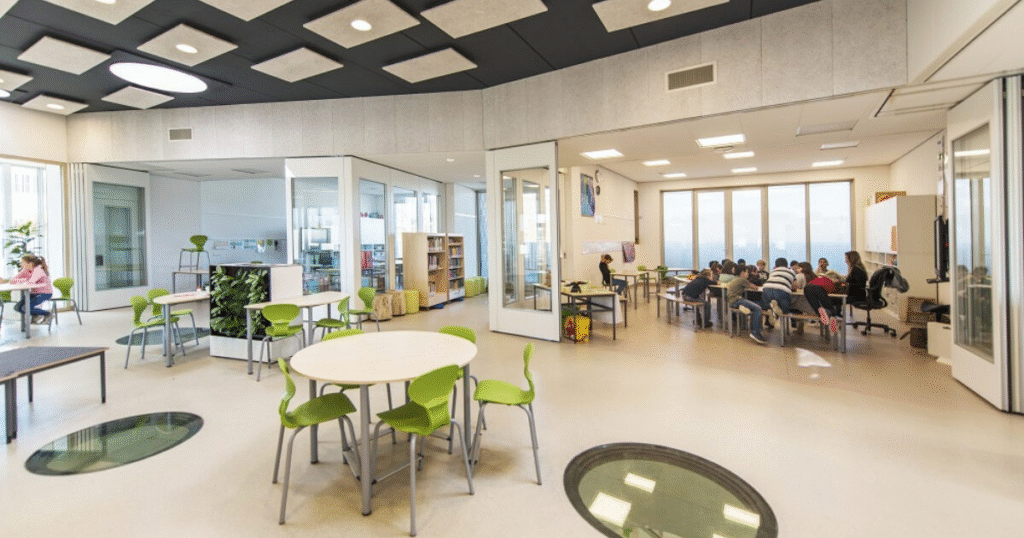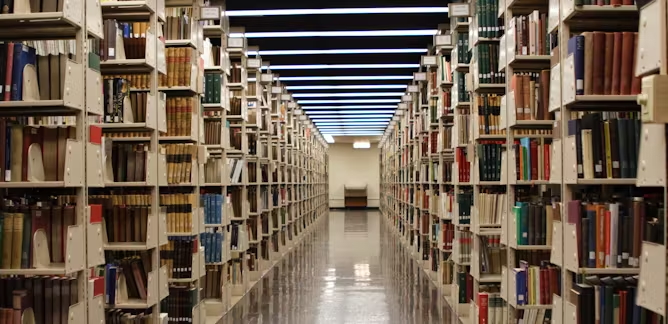When you think of a university library, the image that often comes to mind is a quiet space filled with rows of books. But in today’s academic world, university libraries are much more than that — they are dynamic centers of learning, research, collaboration, and innovation. For students aiming to achieve academic success, university library resources are an essential — and often underused — asset.
This article will explore how you can use university library resources to boost your learning, deepen your research, and ultimately excel academically. From digital archives to specialized collections, academic support services to collaborative spaces, we’ll cover how modern libraries contribute to student success.
Key Takeaways
- University libraries offer more than just books — they provide access to digital tools, expert support, and spaces for all learning styles.
- Using library resources can greatly improve the quality of your academic work, from essays to advanced research projects.
- Librarians are there to help — make use of their expertise to strengthen your research skills.
- Information literacy is a lifelong skill that libraries help you develop.
- Library technology labs foster creativity and innovation across disciplines.
- Collaborative and quiet study areas help accommodate your preferred learning environment.
- Engaging with your library reduces stress and boosts academic confidence.
The Evolving Role of University Libraries
Beyond Books: The Modern Academic Hub
Gone are the days when libraries were merely places to borrow books or find a quiet spot to study. Modern university libraries provide:
- Extensive digital resources
- Expert librarian support
- Workshops and academic coaching
- Collaborative learning spaces
- Multimedia labs and makerspaces
- Access to rare manuscripts and archives
By offering these diverse resources and services, university libraries play an active role in helping students excel academically — providing support far beyond the classroom.
Access to Scholarly Resources
Books, Journals, and Beyond
University libraries provide students with access to:
- Printed books and periodicals — foundational knowledge for coursework.
- Academic journals — up-to-date research in your field.
- E-books — convenient digital access.
- Databases and indexes — tools for finding scholarly articles, data, and reports.
Why this matters:
Most scholarly research is not available for free online. Library subscriptions give you access to peer-reviewed, credible sources that are crucial for writing high-quality papers and projects.
Specialized Databases and Archives
Deep Research Made Possible
Beyond general collections, libraries offer specialized databases tailored to different disciplines:
- STEM fields: Access to journals like Science, Nature, IEEE, PubMed, and engineering databases.
- Humanities: JSTOR, Project MUSE, historical archives, art catalogs.
- Business and economics: Market research reports, business case studies.
- Social sciences: Psychology databases, sociological studies, public policy archives.
Libraries also curate rare manuscripts, primary sources, and special collections — invaluable for original research.
Digital Resources and Remote Access

Learning Anytime, Anywhere
Modern university libraries break down barriers to learning with robust digital offerings:
- E-books and online journals accessible 24/7.
- Streaming videos and digital media for visual learners.
- Online research guides and subject portals tailored to your major.
- Remote login services so you can access materials from home.
For students balancing academics with work or family commitments, this flexibility is a game-changer.
Research Support Services
Help When You Need It
University libraries provide expert support to help you improve your research skills:
- One-on-one consultations with librarians to refine your research topic and identify key sources.
- Research workshops on citation management, literature reviews, data visualization, and more.
- Interlibrary loan services to obtain materials not available on campus.
- Academic writing centers housed within or partnered with the library.
Tip: Forming relationships with subject specialist librarians can greatly improve the quality of your research papers and projects.
Academic and Technological Resources
Tools for Learning and Innovation
Libraries increasingly provide technology and tools that empower students to produce more advanced and creative work:
- Multimedia labs with video/audio editing software.
- GIS labs for geographic research.
- 3D printing and makerspaces for engineering and design students.
- High-powered computing stations for data analysis and modeling.
- Assistive technologies for students with disabilities.
By integrating technology into the learning environment, libraries foster innovation and critical thinking, essential skills for academic success.
Collaborative and Quiet Study Spaces
Designed for All Learning Styles
Different students have different study preferences. University libraries are designed to support:
- Silent zones for deep concentration.
- Collaborative spaces for group work and discussion.
- Technology-equipped classrooms for interactive learning.
- Comfortable lounge areas for casual study.
Takeaway: Finding your ideal learning environment can help you study more effectively and retain information better.
Information Literacy and Critical Thinking
Building Lifelong Academic Skills
A key benefit of using library resources is that you develop information literacy — the ability to:
- Identify credible sources
- Evaluate the quality of information
- Avoid plagiarism
- Use research ethically and effectively
Information literacy is not just about passing classes; it’s a skill you’ll use throughout your academic career and beyond — in graduate school, the workplace, and everyday life.
Reducing Academic Stress
A Support System You Can Rely On
Academic success is about more than just access to information — it’s also about managing stress, avoiding burnout, and staying organized.
Libraries offer resources that help:
- Time management workshops and productivity seminars.
- Study breaks and well-being programs during exam weeks.
- Spaces designed for relaxation and decompression.
Knowing you have a reliable support system in the library can greatly reduce academic anxiety.
Real-World Applications
Preparing for Professional Success
By using university library resources, you build professional-level skills:
- Advanced research methods
- Data management
- Digital literacy
- Collaborative project work
- Critical analysis of complex problems
These competencies are in demand across industries — making library resources an important part of career preparation.
How Do University Library Resources Support Research and Learning?
Access to Scholarly Information
Libraries give you access to high-quality information that’s not available for free on the internet. This includes:
- Peer-reviewed academic journals
- E-books and print books
- Conference papers
- Market research reports
- Historical archives
- Government publications
Why it matters:
Your professors expect you to use credible sources in your papers and projects. The library gives you access to this kind of information — helping you produce work that is academically rigorous.
Helping You Learn Research Skills
Most university libraries actively teach you how to do research, through:
- One-on-one research consultations
- Workshops on how to search databases
- Instruction in citation styles (APA, MLA, Chicago, etc.)
- Guides for writing literature reviews
- Help with managing sources using tools like Zotero or EndNote
Why it matters:
Strong research skills are essential for academic success — and for your career after graduation. Learning to find, evaluate, and use information effectively helps you in any discipline.
Support for Original Research
For students doing advanced or original research — such as a senior thesis, graduate thesis, or dissertation — library resources are crucial:
- Specialized databases and indexes
- Rare books and manuscripts
- Archival materials
- Data repositories
- Institutional repositories of past theses and dissertations
Why it matters:
Original research often requires digging deeper than textbooks or Google searches. The library provides the tools to help you develop new knowledge in your field.
Access to Technology
Modern libraries are equipped with:
- High-performance computers for data analysis
- GIS labs for mapping and spatial research
- Multimedia labs for video, audio, and digital storytelling
- 3D printers and makerspaces for prototyping
- Scanners and digitization tools
Why it matters:
Research and learning today are digital — and libraries help level the playing field by giving all students access to these advanced tools.
Spaces for Learning

Libraries are designed to support all kinds of learners:
- Silent zones for focused individual study
- Collaborative spaces for group projects
- Tech-equipped meeting rooms for presentations
- Relaxation areas for taking breaks and avoiding burnout
Why it matters:
Having the right kind of study space improves concentration, productivity, and the overall learning experience.
Librarians as Research Partners
University librarians are experts in:
- Subject-specific research
- Advanced search strategies
- Copyright and fair use
- Data management
- Scholarly publishing
Why it matters:
Many students think of librarians only as book experts — but in reality, they are research professionals who can help you refine your topic, find hidden resources, and improve the quality of your work.
Information Literacy Development
Libraries teach information literacy — the ability to:
- Identify trustworthy information
- Spot misinformation
- Analyze sources critically
- Synthesize information ethically and effectively
Why it matters:
In a world of misinformation and disinformation, information literacy is one of the most important skills you can learn — both for academic success and for life as an informed citizen.
Academic Support Programs
Many libraries also offer:
- Tutoring partnerships
- Academic coaching
- Time Management workshops
- Writing centers
- Peer learning programs
Also Read : What Makes a University One of the Best in the World?
Conclusion
Your university library is one of the most valuable — and sometimes overlooked — resources available to you. Whether you’re an undergraduate starting your academic journey, a graduate student pursuing original research, or a lifelong learner, the library has tools to help you succeed.
From scholarly databases to digital technologies, expert research guidance to collaborative spaces, university libraries are evolving to meet the needs of modern students. By fully engaging with these resources, you can sharpen your skills, produce better academic work, and reduce stress — all of which contribute to academic excellence.
FAQs
1. What types of online resources do university libraries offer?
University libraries provide access to e-books, scholarly journals, research databases, streaming media, and digital archives — often available remotely via university login.
2. Can first-year students benefit from library resources?
Absolutely! Many libraries offer orientation sessions and research skills workshops specifically for first-year students to help them get started.
3. How do I find out what databases my library subscribes to?
Most university libraries have a website with a searchable list of databases organized by subject. You can also ask a librarian for recommendations.
4. Are library services only for research-heavy majors?
No — whether you’re in STEM, humanities, social sciences, or the arts, the library has resources tailored to your field, as well as general academic support services.
5. Can I get help with citing sources?
Yes — libraries often provide citation guides, workshops on using citation management tools (like Zotero or EndNote), and one-on-one help.
6. What should I do if the book or article I need isn’t in the library?
Use the interlibrary loan service — your library can borrow materials from other institutions for you, often at no cost.
7. How can I connect with a librarian for research help?
Check your library’s website to book a consultation with a librarian — they often offer in-person, email, or virtual appointments.
